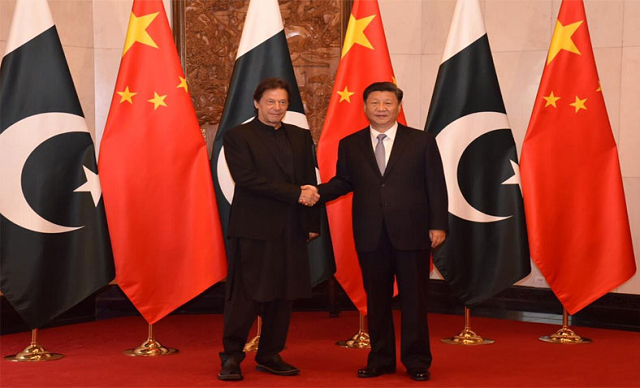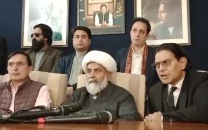China's Xi says he is watching Kashmir, supports Pakistan's core interests
Imran holds wide ranging talks with President Xi

A joint press release issued after the conclusion of Prime Minister Imran Khan's visit to the neighbouring country, said that the Beijing was paying close attention to the current situation in Kashmir and opposed any unilateral actions that would complicate the situation.
The joint press release came on the last day of PM Imran's visit to Beijing.
Prime Minister Imran Khan held a meeting with President Xi Jinping in Beijing today. The two leaders exchanged views on a wide range of bilateral, regional and global issues in a cordial and friendly atmosphere. #PMIKInChina
— Government of Pakistan (@GovtofPakistan) October 9, 2019
(1/3) pic.twitter.com/J1qV6UegK6
During the meetings, according to the press release, the Pakistani side briefed the Chinese leadership on the situation in Jammu and Kashmir, including its concerns, position, and current urgent issues.
The Chinese side responded that it was paying close attention to the current Kashmir situation and reiterated that the issue was a dispute left from history, and should be resolved on the basis of the UN Charter, relevant UN Security Council resolutions and bilateral agreements.
"China opposes any unilateral actions that complicate the situation," said the press release. "The two sides underlined that a peaceful, stable, cooperative and prosperous South Asia was in common interest of all parties. Parties need to settle disputes and issues in the region through dialogue on the basis of equality and mutual respect."
The Prime Minister maintained that China had firmly stood by Pakistan in supporting Pakistan’s core national interests and played a major role in advancing Pakistan’s economic as well as national development goals. #PMIKInChina
— Government of Pakistan (@GovtofPakistan) October 9, 2019
(2/3) pic.twitter.com/PojqxoYWIS
Highlighting the situation in IoJK, Prime Minister stressed the urgency to immediately lift curfew in IoJK to alleviate the sufferings of the Kashmiris to avert risks to peace and security in the region. #PMIKInChina
— Government of Pakistan (@GovtofPakistan) October 9, 2019
(3/3) pic.twitter.com/TXduwytygV
Imran visited Beijing on October 8-9. "Leaders of the two countries had in-depth exchange of views on a wide range of bilateral, regional and international issues of mutual interest," said the press release.
"Meetings were marked by traditional warmth, mutual understanding and strategic trust."
PM Imran also attended the closing ceremony of the Beijing Horticulture Expo 2019 as a chief guest. In his meetings, he congratulated the Chinese leadership and the people on the 70th anniversary of founding of the People's Republic of China.
Prime Minister Imran Khan, along with Premier Li Keqiang, attending the closing ceremony of International Horticulture Exhibition.#PMIKinChina pic.twitter.com/wspQVEiswz
— Government of Pakistan (@GovtofPakistan) October 9, 2019
Imran felicitated China for its remarkable growth and underscored that the reform and opening up process of China was a model for developing countries. He maintained that the steady march of the Chinese nation under its visionary leadership towards national rejuvenation was becoming a reality.
Both sides stressed that the "close ties, deep-rooted friendship and strategic partnership" between Pakistan and China served the fundamental interests of the two countries and their peoples and contributed to peace, stability and development in the region.
"The two sides reaffirmed their support on issues concerning each other's core interests. Chinese leaders reiterated solidarity with Pakistan in safeguarding its territorial sovereignty, independence and security. The Pakistan side reaffirmed its commitment to the One China Policy."
Supporting One Country Two Systems, the press release said, Pakistan reiterated that affairs of Hong Kong were China's internal matter and all countries should uphold international law and basic norms of non-interference in internal affairs of other countries.
The Pakistan side underscored that the China-Pakistan Economic Corridor (CPEC) was a transformational project and that Islamabad had established a CPEC Authority to oversee the expeditious implementation of CPEC projects.
"Both sides maintained that the second phase of CPEC will promote industrial and socio-economic development in Pakistan. Pakistan side also underlined that the Gwadar Port has been granted various facilities enabling it to become a trade and logistical hub for the region."
The two sides, the press release added, expressed determination to speedily execute CPEC so that its growth potential can be fully realised, making it a high-quality demonstration project for Belt and Road Initiative (BRI).
The two sides maintained that the ninth session of the Joint Cooperation Committee (JCC), being held in November in Islamabad, would further fast track the implementation of the ongoing projects and explore new avenues of cooperation, including the Main-Line-1 (ML-1) railway project.
"The two sides underlined that Chinese investment in special economic zones (SEZs) and collaboration in Small and Medium Enterprises (SME) sector would further expand Pakistan's industrial base and diversify its export base," the press release said.
Both sides agreed to jointly study the projects identified by the Pakistan in power, petroleum, gas, agriculture, industrial and infrastructure sectors. Those projects were entrusted to the concerned joint working groups (JWGs) for consideration by the Joint Coordination Committee (JCC).
The two sides held in-depth exchange of views on deepening bilateral cooperation in the areas of trade, investment, finance, defence and security, education, agriculture, social sector, people-to-people contacts and cultural linkages.
Both sides underlined that educational links between the two countries were becoming stronger. PM Imran hoped that the students studying in China would play an important role in deepening the historic and deep-rooted ties between the two countries.
The prime minister thanked the Chinese leadership for China's consistent support for Pakistan's economic development. The two sides agreed that early implementation of the second phase of the China-Pakistan Free Trade Agreement (FTA) would contribute to increase in bilateral trade.
"Both sides agreed to take full advantage of the China-Pakistan Joint Economic and Trade Commission to achieve balanced and sustainable development of bilateral economic and trade cooperation."
The leaders also reviewed the bilateral defence cooperation and agreed to further strengthen this cooperation in the areas of military exercises, training cooperation, personnel exchanges, and equipment and technology cooperation.
Reaffirming that there was no military solution in Afghanistan, the two sides agreed that peace and stability in Afghanistan was vital for regional security and expressed satisfaction at the outcome of the third China-Afghanistan-Pakistan Foreign Minister's Dialogue held in Islamabad on September 7.
The Chinese side appreciated Pakistan's efforts for promoting peace and reconciliation process in Afghanistan. Both sides maintained that an inclusive, and Afghan-led and Afghan-owned peace process would be key to bring peace and stability in the war-torn country.
Both sides reaffirmed their commitment to fight terrorism in all its forms and manifestations, and called on all countries to strengthen international cooperation on counter-terrorism. China appreciated Pakistan's unrelenting efforts and tremendous sacrifices in countering terrorism.
"It [China] supported Pakistan in implementing its National Action Plan and called on the international community to objectively recognise Pakistan's contributions to regional peace and security through its success in fight against terrorism," the press release said.
Both sides expressed satisfaction over the close cooperation between the two countries at multilateral fora and resolved to deepen strategic coordination and consultation. Both sides reaffirmed their commitment to the purposes and principles of the UN Charter, and support for multilateralism and win-win cooperation.
During the visit, Premier Li Keqiang and PM Imran witnessed the signing of the various Agreements/MoUs. Imran thanked China for their warm hospitality, and invited the Chinese leadership to visit Pakistan at a mutually convenient time.
Earlier, according to China's Xinhua news agency, President Xi Jinping and PM Imran vowed to work jointly to strengthen strategic coordination and pragmatic cooperation so as to forge a closer China-Pakistan community of shared future in the new era.
During the meeting at the Great Hall of People, Xi told Imran China always viewed its relations with Pakistan as a diplomatic priority and would continue to firmly support Pakistan on issues concerning its core interests and of major concern.
Xi called on the two sides to maintain close high-level exchanges, step up strategic communication and coordinate positions on major issues. In the past, Pakistan selflessly provided help to China in difficult times, and now that China has developed, it sincerely hopes to help Pakistan for better development, he added.
Xi stressed no matter how the international and regional situation changes, China had always viewed relations with Pakistan as a diplomatic priority and would continue to firmly support Pakistan on issues concerning its core interests and of major concern to it.
Imran praised Beijing for always adhering to principles and upholding justice. He also offered his congratulations to the Chinese leadership on the occasion of 70th anniversary of the founding of the People's Republic of China. Xi highlighted a series of celebration activities to mark the occasion.
"Chinese people… have forged a cohesive force with unprecedented patriotism, consolidating our confidence and determination to continue down the path of socialism with Chinese characteristics against all odds, run our own affairs, and stand firm in the community of nations," Xi said.
On the China-Pakistan Economic Corridor (CPEC), Xi said the two sides should adopt a high standard, build and effectively run the existing energy projects, transport infrastructure, industrial parks and projects concerning people's livelihoods, and make the CPEC a model for the BRI.
The Chinese President called on the two sides to beef up communication and cooperation within the United Nations, the Shanghai Cooperation Organisation and other multilateral mechanisms to jointly safeguard regional peace and stability.
Imran expressed his gratitude to China for its firm support and selfless help to Pakistan. "China has never asked anything for its support to our national interest and helped us without any conditionality," Khan said, adding that Beijing had supported Islamabad in all difficult times.
The prime minister briefed the Chinese president about Pakistan's present situation and said Pakistan had come out of difficult economic situation and "we will never forget China's financial cooperation" in this regard.
Xi lauded agenda of Imran Khan's government of socio-economic development and people-centric progress. "President Xi maintained that Pakistan through institutional and economic reforms was resolutely and promisingly on the way to substantial economic development.
The prime minister was accompanied by Foreign Minister Shah Mehmood Qureshi, Planning Minister Khusro Bakhtiar, Railways Minister Sheikh Rasheed, Commerce Adviser Razak Dawood, Special Assistant on Petroleum Nadeem Babar, Board of Investment Chairman Zubair Gilani, Army Chief Gen Qamar Javed Bajwa and Inter-Services Intelligence Director General Lt-Gen Faiz Hameed.
Later, the prime minister called on Li Zhanshu. During the meeting, Imran noted that Pakistan wanted to learn from China's experience of poverty mitigation and expressed his determination to reduce poverty in Pakistan by following China's model.
He also solicited support of China in improving Pakistan's agriculture and artificial intelligence sectors. He proposed that, given Pakistan's unique advantages, Chinese companies may relocate their industries to Pakistan.
He underscored that India's illegal actions of August 5 had created a dire humanitarian situation in the occupied Kashmir and urged that the curfew imposed for over two months in Indian-Occupied Kashmir should be lifted immediately enabling people to have access to basic human needs.
Chairman Li reaffirmed Chinese leadership's commitment to support Pakistan on issues of its core national interest. He said China would support Pakistan in initiatives proposed by PM Imran.
Li maintained that both China and Pakistan could propose new projects that could be included in the CPEC. PM Imran extended invitation to the NPC chairman to visit Pakistan, which was accepted.
Both leaders agreed to carry forward the momentum of bilateral visits and enhance parliamentary linkages to further cement Pakistan-China bilateral ties. They also underscored commitment to enhance cooperation in political, cultural, educational and people-to-people ties.



















COMMENTS
Comments are moderated and generally will be posted if they are on-topic and not abusive.
For more information, please see our Comments FAQ